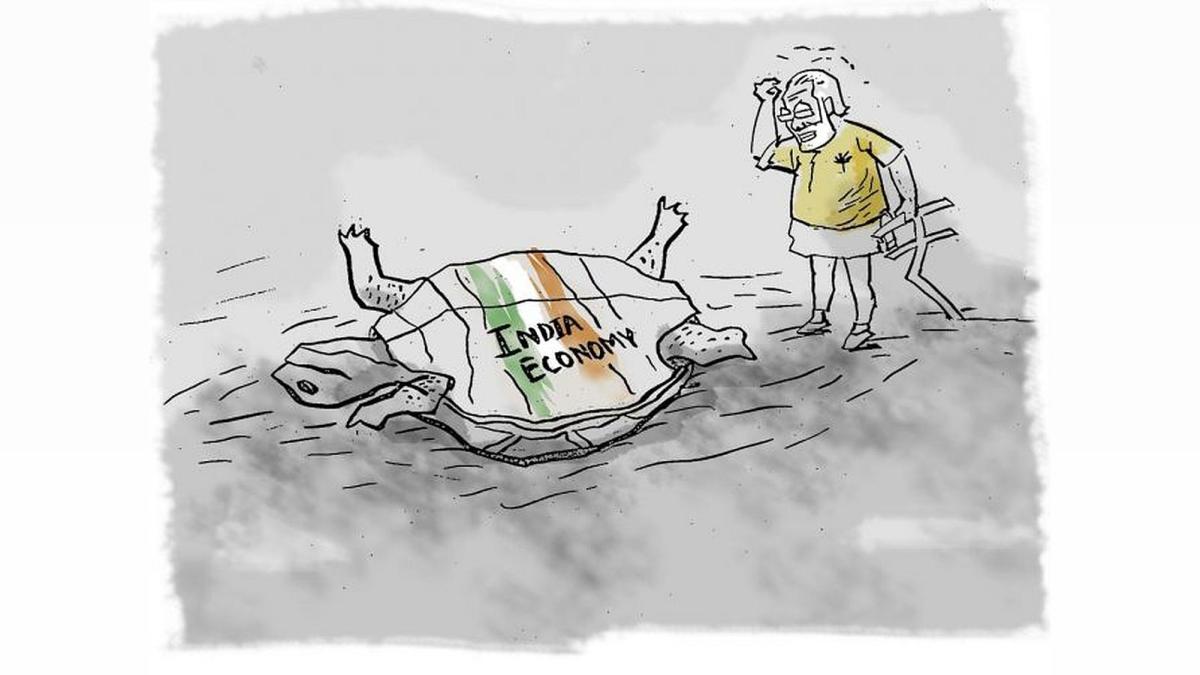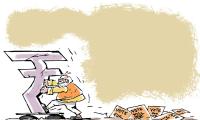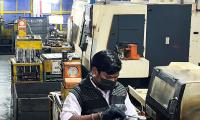Gujarat: India's Growth Engine with 15% CAGR
Gujarat's economy has grown at a CAGR of 15% since 2002, exceeding national average. Discover how Gujarat has become India's growth engine.

Illustration: Dominic Xavier/Rediff.com
Ahmedabad, Jan 5 (PTI) With a Compound Annual Growth Rate (CAGR) of 15 per cent from 2002-03 to 2022-23, which was higher than the national average during the period, Gujarat has maintained its position of being one of the fastest-growing states in the country, the state government said.
With such strong economic fundamentals, Gujarat has for long been recognised as the 'growth engine of India', it said.
"When we started the Vibrant Gujarat Summit (two decades ago when he was Gujarat CM), it was our intention that the state should become the growth engine of the country's progress. With only 6 per cent of India's land mass and 5 per cent of its population, Gujarat has achieved the distinction of being one of the most industrially developed states," Prime Minister Narendra Modi said recently.
The latest edition of the Vibrant Gujarat Global Summit (VGGS) is expected to accelerate the pace of development in the state and help further strengthen the fundamentals of the economy of the state and India.
The 10th edition of the VGGS will be held between January 10 and 12 in Gandhinagar.
At Rs 22.61 lakh crore, Gujarat contributes around 8 per cent of India's Gross Domestic Product (GDP), government data said.
Gujarat-based economist Hemant Shah said, "Gujarat's GDP growth rate was higher than the GDP growth rate of India. Although the GDP growth rate of other states went up over the years, our economic growth rate remained higher than other states. This was one of the reasons why business houses look towards Gujarat for investment."
In terms of the sectoral contribution within Gujarat, the manufacturing sector contributes around 36.7 per cent in Gujarat's GSDP, as per the official data of financial year 2021-22.
Executive Committee member of Gujarat Chamber of Commerce & Industry (GCCI), Sachin K Patel, explained how business-friendly policies of the Gujarat government gave a boost to the Micro, Small and Medium Enterprises (MSME) sector.
"MSME is the backbone of our country and it gives the maximum amount of employment in the country and in Gujarat. Thanks to the business-friendly policies of the state government, more and more MSME units are being set up in the state," he said.
This economic growth has had a transformative effect on employment and living standards of workers, a government release said.
According to the annual report of the Periodic Labour Force Survey (PLFS), in the year 2020-21, Gujarat had a Labour Force Participation Rate of 44.3 per cent, Worker Population Ratio (WPR) of 43.3 per cent (for all age groups) and unemployment rate of 2.2 per cent, which was the lowest among the major industrialised states.
"I have been associated with the ceramic line for a very long time. My family members were also associated with it in the past. A lot of people like me are getting employment in this sector. Not just Gujarat, people from outside the state are also getting employment opportunities here," said Jagdish Chaudhary, a worker in the ceramic factory.
The growing economy has also helped the state make substantial strides in the social sector, especially education and health.
Primary health centres (PHCs) and community health centres (CHCs) in Gujarat registered a growth of 41 per cent and 37 per cent, respectively, from 2001-02 to 2021-22.
A total of 319 CHCs, 1463 PHCs and 6575 sub-centres were functioning in the state at the end of November 2022, the government release said.
There are over 30 medical colleges functioning in Gujarat today as compared to only nine medical colleges in 2001.
"The initiative of Cataract-mukt Abhiyan (cataract-free mission) was initiated by our CM Bhupendra Patel. We conducted 8 lakh cataract operations. We identified a total of 19,000 patients who had cataract in both their eyes, we did cataract surgeries which came out to be successful. If we talk about cataract, it is getting well treated in Gujarat," Dr Nilam Patel, additional director of the health department, said.
The state has made giant strides in the field of education during the two decades. The dropout rate in elementary school has decreased substantially from 22.30 per cent in 1999-00 to 1.32 per cent in 2020-21. Similarly, the dropout rate between standard I and VIII has decreased from 41.48 per cent in 1999-00 to just 3.07 per cent in 2020-21.
India's first Vidya Samiksha Kendra (VSK) was set up in 2019. The VSK was aimed at leveraging data and technology to bring a big leap in learning outcomes. PM Modi visited the facility in Gandhinagar in April 2022 and asked other states to study and replicate Gujarat's VSK model to holistically develop education.
VSK has been deemed a Global Best Practice by the World Bank.
With such strong economic fundamentals, Gujarat has for long been recognised as the 'growth engine of India', it said.
"When we started the Vibrant Gujarat Summit (two decades ago when he was Gujarat CM), it was our intention that the state should become the growth engine of the country's progress. With only 6 per cent of India's land mass and 5 per cent of its population, Gujarat has achieved the distinction of being one of the most industrially developed states," Prime Minister Narendra Modi said recently.
The latest edition of the Vibrant Gujarat Global Summit (VGGS) is expected to accelerate the pace of development in the state and help further strengthen the fundamentals of the economy of the state and India.
The 10th edition of the VGGS will be held between January 10 and 12 in Gandhinagar.
At Rs 22.61 lakh crore, Gujarat contributes around 8 per cent of India's Gross Domestic Product (GDP), government data said.
Gujarat-based economist Hemant Shah said, "Gujarat's GDP growth rate was higher than the GDP growth rate of India. Although the GDP growth rate of other states went up over the years, our economic growth rate remained higher than other states. This was one of the reasons why business houses look towards Gujarat for investment."
In terms of the sectoral contribution within Gujarat, the manufacturing sector contributes around 36.7 per cent in Gujarat's GSDP, as per the official data of financial year 2021-22.
Executive Committee member of Gujarat Chamber of Commerce & Industry (GCCI), Sachin K Patel, explained how business-friendly policies of the Gujarat government gave a boost to the Micro, Small and Medium Enterprises (MSME) sector.
"MSME is the backbone of our country and it gives the maximum amount of employment in the country and in Gujarat. Thanks to the business-friendly policies of the state government, more and more MSME units are being set up in the state," he said.
This economic growth has had a transformative effect on employment and living standards of workers, a government release said.
According to the annual report of the Periodic Labour Force Survey (PLFS), in the year 2020-21, Gujarat had a Labour Force Participation Rate of 44.3 per cent, Worker Population Ratio (WPR) of 43.3 per cent (for all age groups) and unemployment rate of 2.2 per cent, which was the lowest among the major industrialised states.
"I have been associated with the ceramic line for a very long time. My family members were also associated with it in the past. A lot of people like me are getting employment in this sector. Not just Gujarat, people from outside the state are also getting employment opportunities here," said Jagdish Chaudhary, a worker in the ceramic factory.
The growing economy has also helped the state make substantial strides in the social sector, especially education and health.
Primary health centres (PHCs) and community health centres (CHCs) in Gujarat registered a growth of 41 per cent and 37 per cent, respectively, from 2001-02 to 2021-22.
A total of 319 CHCs, 1463 PHCs and 6575 sub-centres were functioning in the state at the end of November 2022, the government release said.
There are over 30 medical colleges functioning in Gujarat today as compared to only nine medical colleges in 2001.
"The initiative of Cataract-mukt Abhiyan (cataract-free mission) was initiated by our CM Bhupendra Patel. We conducted 8 lakh cataract operations. We identified a total of 19,000 patients who had cataract in both their eyes, we did cataract surgeries which came out to be successful. If we talk about cataract, it is getting well treated in Gujarat," Dr Nilam Patel, additional director of the health department, said.
The state has made giant strides in the field of education during the two decades. The dropout rate in elementary school has decreased substantially from 22.30 per cent in 1999-00 to 1.32 per cent in 2020-21. Similarly, the dropout rate between standard I and VIII has decreased from 41.48 per cent in 1999-00 to just 3.07 per cent in 2020-21.
India's first Vidya Samiksha Kendra (VSK) was set up in 2019. The VSK was aimed at leveraging data and technology to bring a big leap in learning outcomes. PM Modi visited the facility in Gandhinagar in April 2022 and asked other states to study and replicate Gujarat's VSK model to holistically develop education.
VSK has been deemed a Global Best Practice by the World Bank.
You May Like To Read
TODAY'S MOST TRADED COMPANIES
- Company Name
- Price
- Volume
- Vodafone-Idea-L
- 11.65 (+ 3.56)
- 106772451
- Alstone-Textiles
- 0.28 ( -3.45)
- 44187760
- Mangalam-Industrial
- 0.88 ( -2.22)
- 39177573
- Sunshine-Capital
- 0.27 (+ 3.85)
- 35956340
- GMR-Airports
- 104.40 (+ 6.37)
- 30453005






